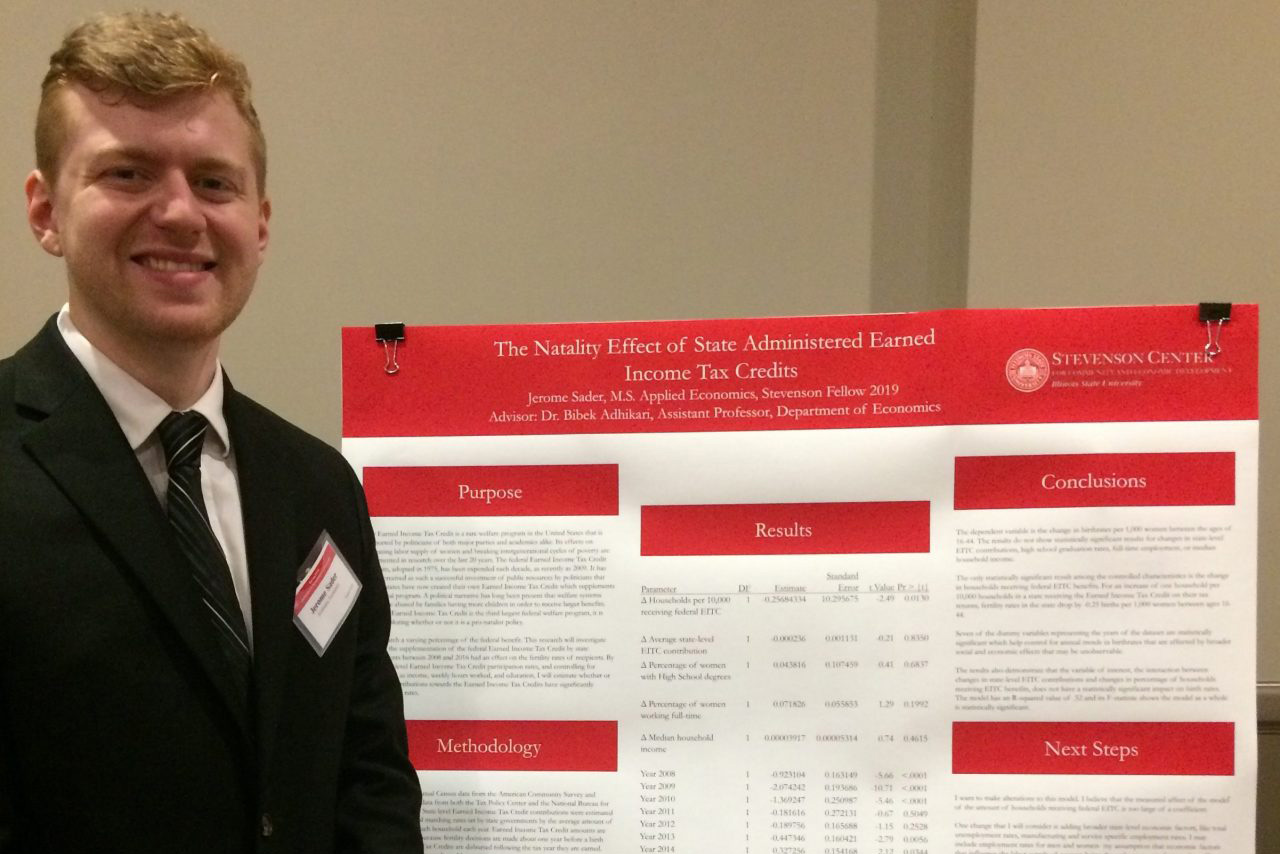Like most Stevenson Center students, Jerome Sader ’19 was drawn to using his education for the public good. A graduate of the Applied Community and Economic Development Fellows (ACED) program, Sader recently completed his capstone project focused on the effect welfare may or may not have on whether women have children.
Sader came to Illinois State in 2017 to pursue a master’s degree in applied economics. After earning a B.A. in economics with a minor in politics from Willamette University in 2015, he served in Chicago with City Year, an AmeriCorps program focused on high-need schools. He then worked as a community engagement coordinator for Cradles to Crayons, which seeks to meet the needs of children living in poverty. As an ACED Fellow, Sader completed an intense year of coursework followed by 11 months of professional practice working on policy issues for Housing Action Illinois.
Depending on their degree program, Fellows may complete a thesis or a capstone project. Sader explains what captured his interest in the issues of childbearing and welfare: “A lot of research was poured into this topic during the 1990s when welfare systems were reformed to essentially require welfare recipients to be employed to be eligible. [President] Reagan spoke of a ‘young woman from Chicago’ who was abusing the welfare system, and The New Republic infamously featured a black mother smoking a cigarette in their issue that reported on the Clinton-era reform. So, to me, this topic is very racially charged and important to explore.”
“The politics of welfare systems often result in lawmakers making claims about supposedly perverse incentives,” Sader continues. “A pervasive myth of welfare politics in the United States has been that welfare causes young, poor—and particularly black—women to bear children solely to increase their welfare allocations. The Earned Income Tax Credit (EITC) is one of the country’s largest remaining welfare programs, and much of the research around fertility and welfare incentives was conducted in the late 1990s and early 2000s. With so much new data since then, I saw an opportunity to update this literature.”
Sader’s findings were congruent with past studies on this topic, in that they debunked the speculation that welfare assistance encourages women to have children. And although his project yielded similar results to past studies, his methodology differed. Rather than tracking individual households over time, Sader approached the question with macro-level data. In “The Natality Effect of State Administered Earned Income Tax Credits,” Sader used data from each state individually over an approximately 10-year span. Using “difference-in-difference” regression, he analyzed the variation between every state’s EITC and its fertility rates and focused on the marginal impact of the state’s spending.
“If Illinois increased its EITC rate such that an average family received an extra $100 per year, my research studies to what extent that extra $100 is associated with a change in household fertility rate,” Sader said.
Like most Fellows, Sader knew that his capstone project would be a huge undertaking, from securing and analyzing the data to sharing his findings. “It’s really important to pick a topic that intrigues you—even if only a little—and to stick with it,” he advises. In any large, ongoing research project there will be feelings of frustration and doubt. “You will also go through periods where you feel very happy with the work you are doing,” Sader said.
A capstone project or thesis can demonstrate the analytical and communication skills helpful in securing meaningful employment after graduation. Sader is now the neighborhood network manager for Austin Coming Together.
The Stevenson Center for Community and Economic Development welcomes those who have at least one year of full-time experience in community development or social services, whether through employment or programs like AmeriCorps and Peace Corps. Fellows’ internships are in all types of communities, in Illinois and in other states. Want to learn more about becoming OR hosting a Stevenson Center Fellow? Contact us at StevensonCenter@IllinoisState.edu or (309)-439-7090.
Shaylin Quaid is the Stevenson Center’s public relations intern.

